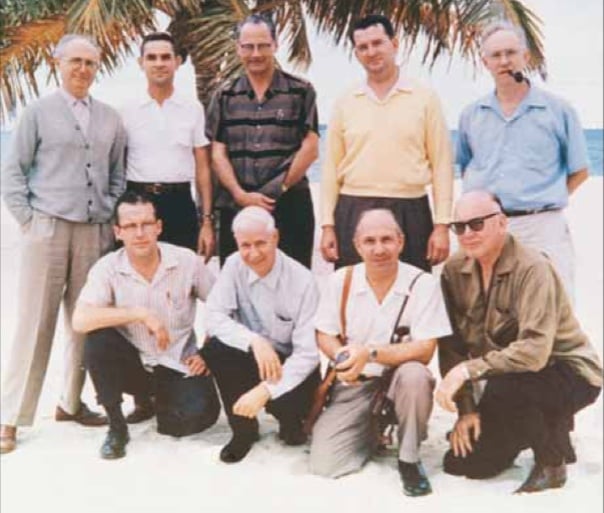Text of the Skit
The December 1959 Nassau, Bahamas conference, sponsored with the generous support of Malcolm Fraser from the then Speech Foundation of America (now the Stuttering Foundation of America), brought together several of the leading authorities in the area of stuttering. The following skit was "composed as therapeutic exercise by J. Sheehan. Roles taken by wives with connivance of V. Sheehan." It was sent by Jane Fraser, of the SFA. Students might find it interesting to research just why this skit is so funny!

Back row: Freund, Luper, Johnson, Sheehan, Van Riper
Front row: Williams, Fraser, Ainsworth, West
TEN AUTHORITIES IN SEARCH OF AN AGREEMENT
Malcolm Fraser: Gentlemen, before we begin, I say above all, let's be practical.
Stanley Ainsworth: If we're going to get this job finished, we've got to consider broad categories first, and details later. Here are your assignments. . .
Fraser: Do it any way you want, just so you are practical.
Ainsworth: I'm sure there is much basic agreement here, and our job is to find it. Hal and I have dittoed all the techniques ever recommended by Van Riper, Gypsy Rose Lee, and the Bogue Institute. Let's start with those.
Charles Van Riper: But are we doing what we really want to do? Are we following wise procedures? I doubt the wisdom of all of this.
Wendell "Jack" Johnson: What we need are data. . . . Facts. . . . More facts. . . . Our job. . . . get 'em.
Dean Williams: I'm with you there, Jack.
Joseph Sheehan: But facts aren't very psychotherapeutic. The stutterer has got to get integrated in new roles, that's all. That's his way out of the problem.
Fraser: Gentlemen, let's be practical.
Ainsworth: At least we can all agree, the stutterer has a problem.
Robert West: From the medical standpoint, I can't agree with that. Think of all the worse things he could have. Muscular dystrophy, for instance. Or syphilis.
Henry Freund: But what are we doing to the patient? You can't treat him with just a simple set of rules.
Fraser: You fellows may know what you're doing, but let's be practical.
Williams: All sounds like spookology to me.
Hal Luper: I'm not an authority here, but if I may say- - - -
Freund: Let's accentuate the positive. . . . eliminate the negative.
Sheehan: And cut out Mr. In-between.
Van Riper: get rid of fixations and tremors.
Johnson: What do you mean, fixations? It tends primarily to be a matter of your evaluations.
West: Speaking of tremors, what about epilepsy?
Fraser: Gentlemen, remember we've got to be practical.
Ainsworth: We've got to get organized! - integrated. Think big. We'll never finish at this rate.
West: Rate. Rate of diadochokinesis. That reminds me of a medical problem. Take Huntington's Chorea, for instance.
Johnson: But where are the data? Just the facts, that's all. Just the facts. Our job. . . state 'em in operational language.
Sheehan: Sounds too concrete to me. You've got to have some sensitivity and clinical judgment. Let's reduce the avoidance drive.
Williams: Now there's real spookalogy for you.
Luper: If I may say a word - - -
Ainsworth: Let's look at the big picture. Get integrated.
West: That reminds me of a medical problem. Tabes dorsalis.
Van Riper: I think we're all trapped in the wrong postural fixation.
Freund: Let's remember the patient. Oedipus complex? What's the difference as long as he loves his mother?
Williams: Eliminate the "it."
Johnson: Change the evaluations.
West: Get rid of the spirochetes.
Sheehan: Build up the approach.
Van Riper: Desensitize.
Ainsworth: We'll never finish this way.
Johsnon: What do you mean, "finish"? Aren't we going to end with "et cetera?"
West: That reminds me of a medical problem. Bubonic plague.
Fraser: Gentlemen, above all, I say let's be practical.
THE END
added with permission of Jane Fraser
July 2, 2003

